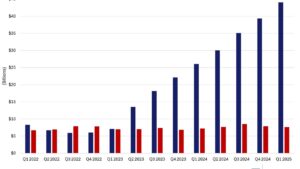I like Wolf Richter’s work and subscribe to his blog Wolf Street. His work is detailed and he’s covered recent issues in the housing market as well or better than anyone. Yesterday, he released a piece on the huge San Francisco hotel where the owner handed the keys back to the lender at a massive discount from the original purchase price.
I respect Richter’s work, but disagree with him on two points. First, he claims Park Hotels screwed investors by refusing to pay the mortgage. I’m not sure that’s the case. Park Hotels did refuse to pay the mortgage and debt holders and commercial mortgage-backed security owners will take a loss. However, when I use the term “screwing someone”, I’m typically referring to something illegal or which breaks an agreement.
That’s not what happened here. I’m going to admit that I haven’t read the mortgage documents for the property, but the borrower typically doesn’t have an obligation to pay. That’s why the underlying property is used as collateral. That’s so if the borrower doesn’t pay, the lender can seize the property. The borrower has the choice to make the monthly payments or to forfeit the property. You can do the same with your home if you have a mortgage and don’t mind losing your house.
Park Hotels didn’t screw anyone. Execs there determined the hotel was worth less than the mortgage amount, saw that refinancing at higher rates was uneconomical, and walked away from the property. Had they tried to not pay the mortgage and also keep the property, I’d be on board with Richter’s description.
Richter also disagreed with the Wall Street Journal article characterizing the bad state of San Francisco as the reason for Park Hotels’ decision to default. San Francisco is a mess. We’ve all seen videos of street defecation, public drug use and needles on the sidewalk, and tent cities. Crime is so rampant that the city no longer prosecutes shoplifters as long as they stay below a generous theft limit. To me, that seems like a good reason to want to exit a market if you’re running a consumer-based business.
Richter correctly points to rising crime in areas that aren’t San Francisco, general problems in the retail property market, a decline in the convention business that frequented the hotel in question, and the rise of non-hotel guest properties by companies like AirBnB.
He’s right about all of those things, but I don’t think it’s a coincidence that huge hotels in San Francisco are defaulting, that retail is fleeing the city, and that crime is skyrocketing (even if the DA there wants to redefine crime). In the end, it doesn’t matter whether Richter is right or I am. It doesn’t matter why Park Hotels walked away. Revenue per available room is down 23% from 2019. That alone is reason enough. If your employment and security costs are rising while you lose 23% of your room revenue, it’s going to result in a distressed property.
This brings me to the key point in all of this; what to do about it. It doesn’t matter if any of us think Park Hotels acted badly or wisely. If you’re counting on someone to continue to operate a property with falling revenue, rising expenses, a bad neighborhood, and a value below the mortgage, you’re going to get a bad outcome. The answer here is to not own commercial mortgage-backed securities with exposure to any of the above issues.
Richter correctly points out that most people who owned these CMBSs don’t know it. The securities are likely owned by pension funds. This is why despite the difficulty, it’s important to know what you own. If you’re counting on your employer to select the “best” funds for your pension investments, you might be surprised how unqualified some of those people making the selections are. There’s no substitute for doing your own due diligence.
Best next steps for anyone concerned about this:
- Figure out what you own. Your pension fund has disclosures and you can see the positions they hold on your behalf. If you see a bunch of stuff in there you don’t understand, it’s time to start asking tough questions.
- Subscribe to Wolf Street. I disagree with Richter today, but overall, his work is excellent.
- Get a premium subscription to DKI. Of course I’m biased, but we have helped people like you make money in tough markets since our founding.
Information contained in this report is believed by Deep Knowledge Investing (“DKI”) to be accurate and/or derived from sources which it believes to be reliable; however, such information is presented without warranty of any kind, whether express or implied and DKI makes no representation as to the completeness, timeliness or accuracy of the information contained therein or with regard to the results to be obtained from its use. The provision of the information contained in the Services shall not be deemed to obligate DKI to provide updated or similar information in the future except to the extent it may be required to do so.
The information we provide is publicly available; our reports are neither an offer nor a solicitation to buy or sell securities. All expressions of opinion are precisely that and are subject to change. DKI, affiliates of DKI or its principal or others associated with DKI may have, take or sell positions in securities of companies about which we write.
Our opinions are not advice that investment in a company’s securities is suitable for any particular investor. Each investor should consult with and rely on his or its own investigation, due diligence and the recommendations of investment professionals whom the investor has engaged for that purpose.
In no event shall DKI be liable for any costs, liabilities, losses, expenses (including, but not limited to, attorneys’ fees), damages of any kind, including direct, indirect, punitive, incidental, special or consequential damages, or for any trading losses arising from or attributable to the use of this report.



